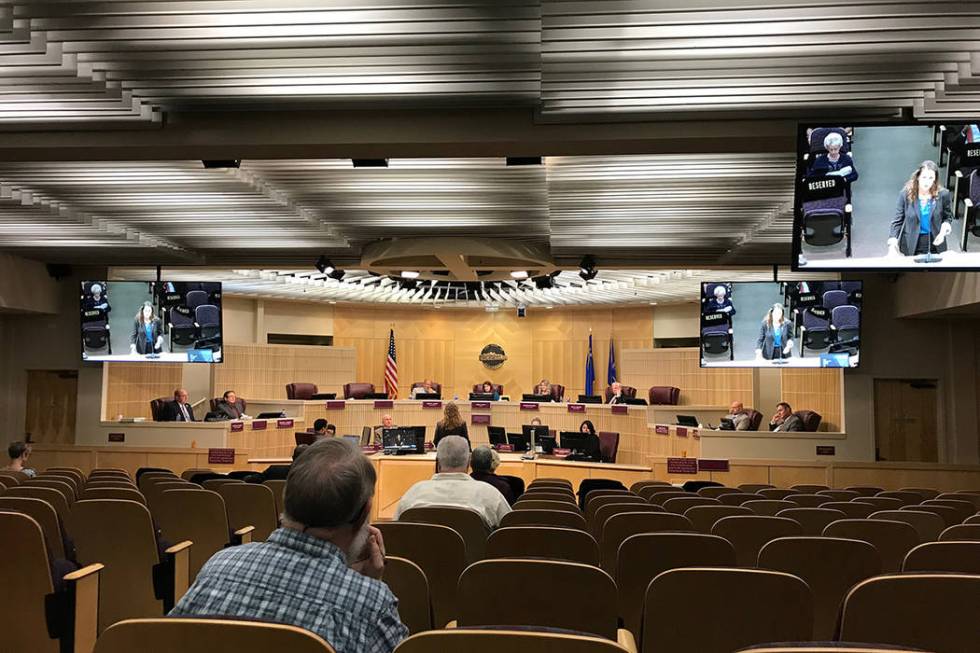Public may still have to pay for Henderson public records

Henderson plans to introduce an ordinance that would allow it to continue charging the public for staff time in fulfilling open records requests in some cases.
The move comes despite a shift in state law that critics contend prohibits such charges.
“It seems to me they’re playing word games in an effort to get around the law,” said Ben Lipman, vice president of legal affairs and general counsel for the Las Vegas Review-Journal.
Lawmakers earlier this year removed a provision in the Nevada Public Records Act that allowed governments to charge for “extraordinary use” of worker’s time, leaving government agencies the authority to charge for the actual cost of producing records.
Henderson’s existing ordinance allows for charging requesters for staff time if the records request takes more than 10 hours to compile, review and complete.
Under the proposed change, scheduled to be introduced at the City Council meeting on Tuesday, Henderson deletes the phrase “extraordinary use,” but maintains a provision to charge records seekers for requests that require more than 10 hours to produce. The city would consider staff time an “actual cost” of producing records.
Whether governments can do that is a question Lipman said has not been presented to the courts under the new law.
City spokeswoman Kathleen Richards acknowledged the city’s ordinance would essentially be unchanged.
“As part of the city of Henderson’s ongoing commitment to transparent and open government, we will continue to provide the first 10 hours of research at no cost to the (requester),” Richards wrote in an email. “As you are aware, the city’s 10 hours of free research is unprecedented among government entities.”
Richards said under certain circumstances, fees may be waived entirely.
Maggie McLetchie, the Review-Journal’s outside legal counsel, said Henderson’s proposal ignores the state law’s definition of “actual cost,” which does not include fees a government would face regardless of whether someone requests a public record. (The law says actual costs includes things such as ink, toner, paper and postage, but specifically does not include the costs that the agency would have to bear regardless of a records request.)
“Henderson should not be ignoring the letter or the (spirit) of the Public Records Act,” she wrote in an email Wednesday.
In a letter to Assemblyman Edgar Flores, D-Las Vegas, Legislative Counsel Bureau lawyer Asher Killian said the change in the law still allows government agencies to charge public records requesters for the actual costs they incur in fulfilling requests.
Robert Fellner, policy director at the conservative think tank Nevada Policy Research Institute, said the Legislature was deliberate in deleting the extraordinary use provision of the public records law. He said Henderson’s ordinance still allows extraordinary use charges, but under a different name.
“The Legislature wasn’t playing semantics,” he said.
ACLU of Nevada spokesman Wesley Juhl said the intent of the Legislature was to limit fees that can be charged to make records more accessible to the public.
“I definitely think there’s still work to be done with regard to our open government policies,” Juhl said. “I just don’t think you can do it all in one session”
The Review-Journal, Nevada Policy Research Institute and ACLU of Nevada, among others, worked together during the 2019 legislative session to advocate for strengthening the state’s public records laws.
If introduced as scheduled on Tuesday, the proposed ordinance would come before the Henderson council for discussion and possible adoption on Nov. 19. Nevada’s updated public records act went into effect on Oct. 1.
Contact Blake Apgar at bapgar@reviewjournal.com or 702-387-5298. Follow @blakeapgar on Twitter.